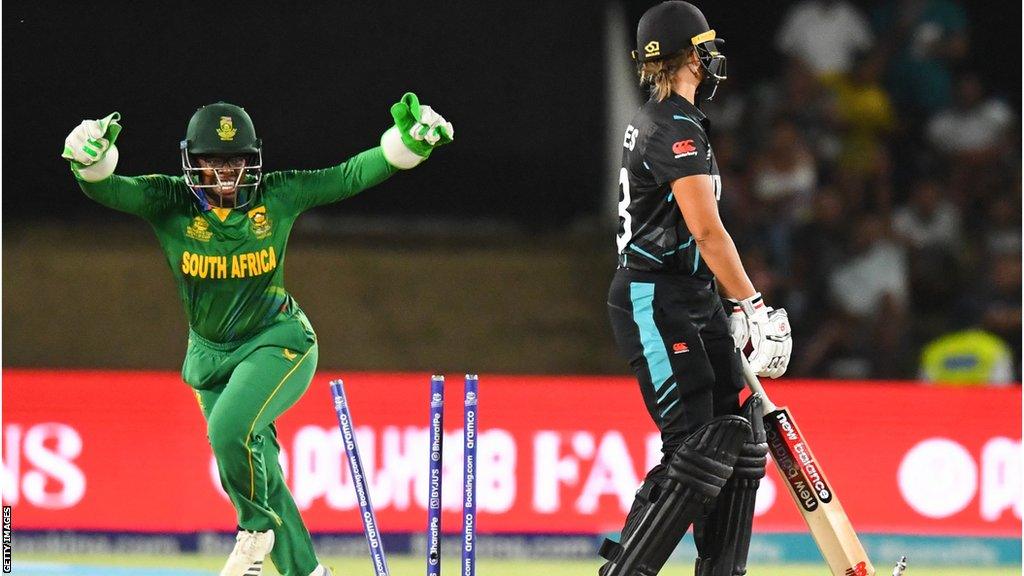Sinalo Jafta: South Africa wicketkeeper on alcoholism and her road to recovery
- Published

South Africa lost their opening game to Sri Lanka in the T20 World Cup before going on to reach the final
Warning: This article contains details of alcohol addiction
When Sinalo Jafta was admitted to a rehabilitation facility for alcoholism in the autumn of 2022, the prospect of playing in a World Cup final just four months later seemed unlikely.
In fact, the game of cricket was not on her mind at all - the South Africa wicketkeeper had assumed her career was over.
"I was there to save my life, and that was my mentality," Jafta, 28, told the BBC's Stumped podcast.
"I was in the mindset that my career was over."
Jafta, who has 57 caps for South Africa across all three formats, admits she was drinking daily but it took her a while to realise the extent of her problem.
But having recently reached the milestone of a year of sobriety, Jafta hopes her story and her recovery can send a positive message to others.
"My drinking started during my first year of university. I was playing hockey, we had socials and fines, and I thought it was all just a bit of fun," she says, in her first interview on the topic.
"But fast forward a couple of years, and it just became what I had to do to cope. Whether I was happy or sad, whatever emotion I had, I would just drink on."
Jafta says that her emotions intensified after returning from the Commonwealth Games in the summer of 2022, which resulted in her going into rehab shortly after.
She also believes online abuse on social media contributed to her mindset, and fuelled the negative thoughts.
"I was in such a bad place that I didn't care what happened to me," Jafta recalls.
"I felt like I was drinking to die because I had nothing left to give."
'Rehab is not the end, it's the beginning'
Jafta says that, at times, the alcoholism made her resent those trying to help, including doctors and team-mates, before the eventual realisation that only she could make the changes.
She spent two months in rehab and credits Cricket South Africa for their support with the process, and her delight when she found out she still had a cricket career when she left the treatment facility in December - and by February, she was playing in a home World Cup.
South Africa lost their opening fixture to Sri Lanka but their triumph over England in the semi-final sparked joyous celebrations in Cape Town as the nation reached its first ever World Cup final in men's or women's cricket.
They lost the final to Australia but for Jafta, there was a much bigger picture.
"I remember walking out feeling very emotional for that first game, but I was also thinking that whatever happens, happens," she said.
"I am still alive, I am sober and I am grateful. It has taught me to take each day as it comes and not to worry about tomorrow."
She describes the recovery process as "tough", with some days harder than others, but it has changed her perspective on life.
"I don't want to keep quiet about it," she said. "I have got a lot more to give.
"Some people think that going to rehab is the final straw, that it's the end. But it's not, it's the beginning - and the acceptance of that was the start of something very beautiful for me."
The experiences also inspired Jafta to set up her own foundation which aims to help young girls access cricket in South Africa, and with future aims to help more women access rehabilitation treatment in the country.
Jafta says she was inspired by her mother, a single parent, who always ensured that she had opportunity and equipment to play sports, while realising there are many girls in the country less fortunate.
"I am one of the lucky ones. I had coaches who helped my mother pay for the equipment that I needed," said Jafta.
"I got so much support and now I have those resources myself, I am passionate about giving that back."
If you have been affected by any of the issues in this story, the BBC Action Line has links to organisations which can offer support and advice.